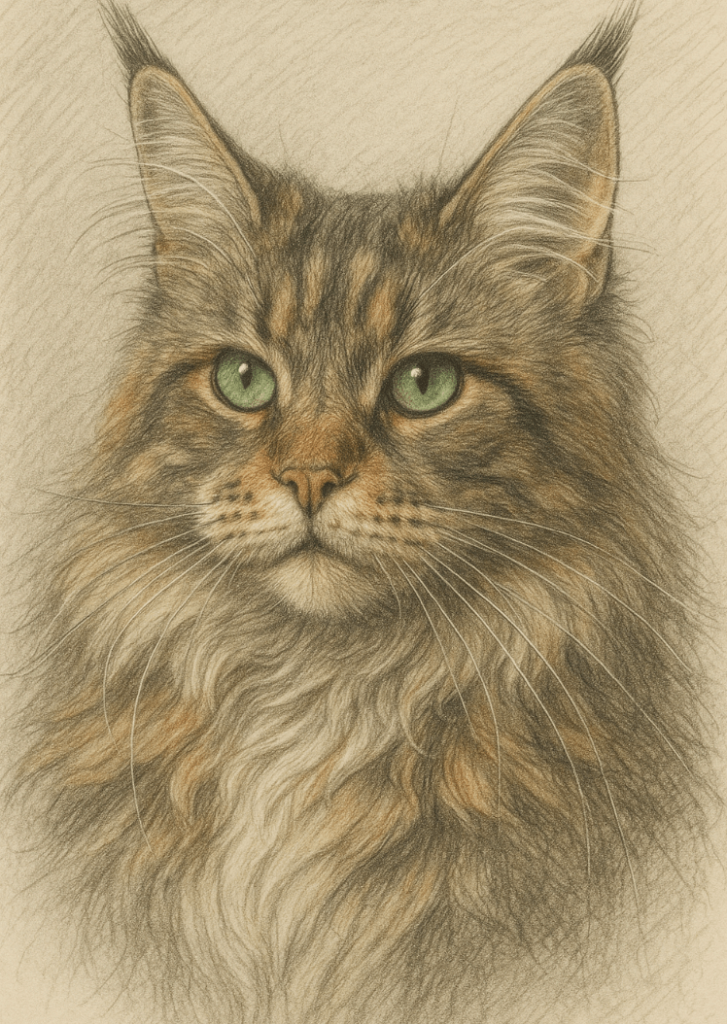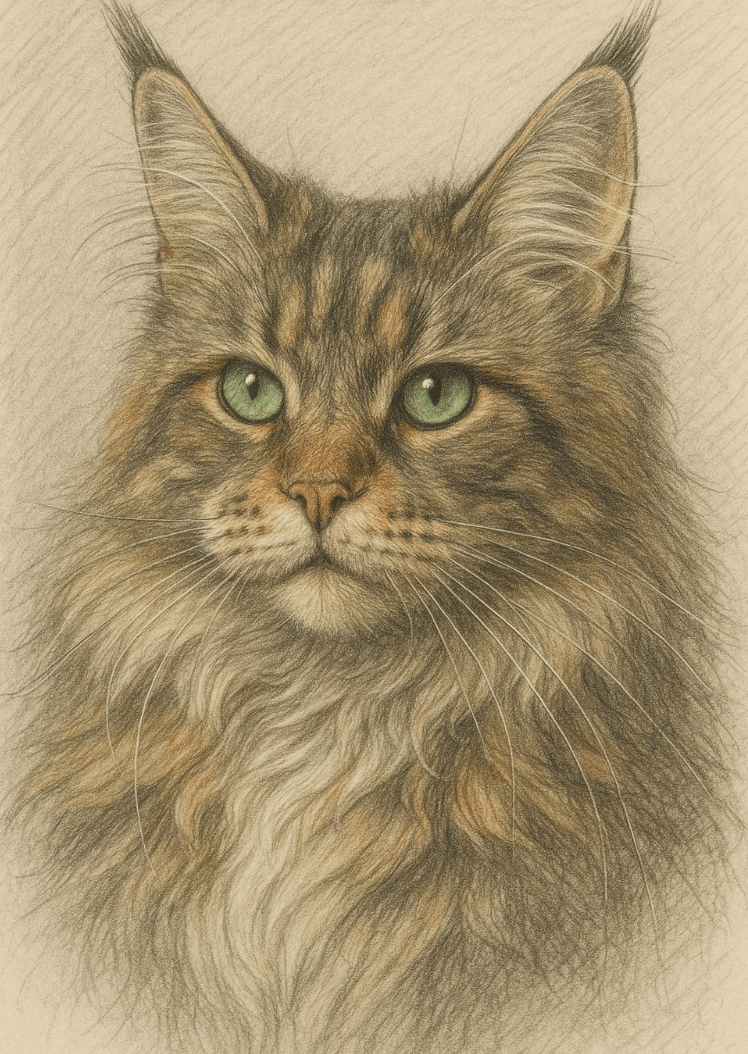Where Do Maine Coon Cats Come From?
The Maine Coon is one of the most beloved and iconic cat breeds, known for its large size, striking appearance, and friendly personality. But where exactly does this majestic feline originate from? While their exact origins remain somewhat shrouded in mystery, the Maine Coon’s history is steeped in folklore, practicality, and regional pride. Native to the United States, this breed has become a symbol of resilience and charm, particularly in the state of Maine. In this blog post, we’ll explore the fascinating backstory of the Maine Coon, separating fact from fiction and uncovering the cultural significance behind this remarkable breed.
The Origins of the Maine Coon Cat
The Maine Coon’s beginnings are surrounded by intriguing tales and plausible theories. While there’s no definitive answer, several explanations have emerged over time to explain how this breed came to be.
Native American Roots Theory:
One theory suggests that the Maine Coon descended from long-haired cats brought to North America by early European settlers, which then interbred with local short-haired cats.Viking Connection Hypothesis:
Some speculate that the Maine Coon shares ancestry with Norwegian Forest Cats, brought to America by Norse explorers around 1000 AD.Maritime Influence:
Another popular theory posits that the breed originated from cats aboard ships, accompanying sailors who docked along the New England coastline.Farm Cat Evolution:
Many believe the Maine Coon evolved naturally as working cats on farms, prized for their ability to hunt rodents and withstand harsh winters.State Pride Symbolism:
By the 19th century, the Maine Coon had become synonymous with the state of Maine, earning recognition as an official state cat due to its prominence in local culture.
These theories paint a picture of a resilient breed shaped by both natural adaptation and human influence.
Distinctive Traits That Define the Maine Coon
What sets the Maine Coon apart from other breeds isn’t just its mysterious origins but also its unique physical and behavioral characteristics. These traits make them stand out as one of the most cherished breeds worldwide.
Impressive Size:
Maine Coons are among the largest domesticated cat breeds, with males often weighing between 13-18 pounds and females slightly smaller.Luxurious Coat:
Their thick, water-resistant fur helps them endure cold climates, featuring tufted ears and a bushy tail reminiscent of wild felines.Gentle Giants:
Despite their imposing size, Maine Coons are known for their affectionate and sociable personalities, often forming strong bonds with their owners.Polydactyl Tendency:
Some Maine Coons are born with extra toes, a trait linked to their maritime heritage and believed to aid in climbing aboard ships.Playful and Intelligent Nature:
This breed thrives on interactive play and problem-solving activities, showcasing their sharp minds and curious spirits.
These distinctive qualities highlight why the Maine Coon continues to captivate cat lovers across the globe.
Check this guide 👉Polydactyl Maine Coon: Best 7 Expert Tips!
Check this guide 👉Himalayan Tuxedo Cat: Best 7 Expert Tips!
Check this guide 👉Burmese Tuxedo Cat: Best 7 Expert Tips!

Facts About Maine Coon Cats | Myths Surrounding Maine Coon Cats |
|---|---|
Originated in the United States | Descended from raccoon hybrids (false) |
Known for their large size | Related to Norwegian Forest Cats |
Thrived as working cats on farms | Result of Marie Antoinette’s pets |
Prized for hunting rodents | Bred exclusively for show purposes |
Official state cat of Maine | Cannot adapt well to warm climates |
Maine Coon Folklore: Tales Behind the Breed
The Maine Coon’s storied past includes several colorful legends that add to its allure. While these stories may not be historically accurate, they contribute to the breed’s mystique and enduring popularity.
Raccoon Ancestry Myth:
One persistent myth claims that Maine Coons are part raccoon due to their bushy tails and tabby-like coloring—a biologically impossible notion.Marie Antoinette Connection:
Legend has it that the queen attempted to flee France with her beloved Angora cats, leaving them behind in Maine when she was captured.Ship’s Cats Lore:
Stories suggest that Maine Coons were bred specifically for life at sea, serving as mousers aboard merchant vessels traveling to New England.Long-Haired Viking Companions:
Another tale links the breed to Scandinavian seafarers who brought long-haired cats to protect food supplies during voyages.Natural Selection Story:
Some believe the harsh winters of Maine led to the evolution of this robust breed, perfectly adapted to survive rugged conditions.
These tales, whether true or fictional, reflect humanity’s fascination with the Maine Coon’s origins.
Caring for a Maine Coon Cat
Owning a Maine Coon comes with specific responsibilities to ensure they thrive in your home. Understanding their needs will help you provide the best care possible for these gentle giants.
Grooming Requirements:
Their thick coats require regular brushing to prevent matting and reduce shedding.Nutritional Needs:
Feed high-quality protein-rich diets to support their active lifestyles and maintain healthy weight.Space Considerations:
Despite being indoor-friendly, Maine Coons appreciate ample space to roam and explore.Social Interaction:
They crave companionship; neglecting socialization can lead to loneliness or behavioral issues.Veterinary Care:
Schedule routine check-ups to monitor common health concerns like hypertrophic cardiomyopathy (HCM).
By meeting these needs, you’ll ensure your Maine Coon remains happy, healthy, and thriving in your care.
Common Misconceptions About Maine Coon Cats
Despite their widespread popularity, several misconceptions persist about Maine Coons. Clarifying these myths ensures potential owners have realistic expectations.
They Are Wild Animals:
While their rugged appearance might suggest otherwise, Maine Coons are fully domesticated and thrive in loving homes.All Maine Coons Have Long Hair:
Though known for their luxurious coats, some individuals may exhibit shorter fur depending on genetics.They Require Excessive Maintenance:
While grooming is necessary, it’s manageable with regular brushing and attention to their coat.They’re Too Large for Apartments:
Despite their size, Maine Coons adapt well to apartment living as long as they have enough stimulation and space.They’re Solitary Creatures:
On the contrary, Maine Coons are highly social and enjoy spending time with their human companions.
Dispelling these myths helps foster a deeper appreciation for this extraordinary breed.
Health Considerations for Maine Coon Owners
Like any purebred cat, Maine Coons are prone to certain health conditions. Being aware of these risks allows you to take preventive measures and ensure a long, healthy life for your pet.
Hypertrophic Cardiomyopathy (HCM):
A common heart condition in Maine Coons; annual screenings and genetic testing can help detect early signs.Hip Dysplasia:
Due to their size, some Maine Coons may develop joint issues; maintaining a healthy weight reduces the risk.Spinal Muscular Atrophy (SMA):
A genetic disorder affecting muscle control; responsible breeding practices minimize its occurrence.Dental Disease:
Regular dental care prevents plaque buildup and gum infections, ensuring overall wellness.Obesity Risk:
Their laid-back demeanor can lead to weight gain; portion control and exercise are key to prevention.
Proactive healthcare ensures a vibrant and fulfilling life for your Maine Coon companion.
Fun Activities to Enjoy with Your Maine Coon Cat
Living with a Maine Coon means embracing opportunities for fun and bonding. These activities cater to their playful and intelligent nature, keeping them entertained and engaged.
Interactive Toys:
Wand teasers, laser pointers, and puzzle feeders stimulate their hunting instincts and keep them active.Agility Training:
Set up simple obstacle courses indoors to challenge their agility and coordination.Water Play:
Many Maine Coons enjoy playing with water; shallow bowls or supervised splashing sessions can be delightful.Cuddling Sessions:
Their affectionate personalities make snuggling on the couch a favorite activity for both of you.Exploration Time:
Create safe spaces for them to climb, jump, and explore, satisfying their curiosity and need for adventure.
Engaging in these activities strengthens your bond and brings out the best in your Maine Coon’s playful spirit.
Frequently Asked Questions About Maine Coon Cats
Are Maine Coons good with children?
Yes, their gentle nature makes them excellent family pets who get along well with kids.
Do Maine Coons shed a lot?
They do shed seasonally, so regular grooming is essential to manage loose fur.
How big do Maine Coons grow?
Males typically weigh 13-18 pounds, while females range from 8-12 pounds.
Are Maine Coons hypoallergenic?
No, they produce allergens like all cats, though some people find them easier to tolerate.
What is their lifespan?
With proper care, Maine Coons live 12-15 years on average.
Celebrating the Legacy of the Maine Coon
From their mysterious origins to their status as beloved household companions, Maine Coon cats embody a unique blend of history, charm, and resilience. Whether through folklore, practical adaptations, or modern-day adoration, this breed continues to leave a lasting impression on cat enthusiasts worldwide. By understanding their background and caring for their needs, you can honor the legacy of the Maine Coon while enjoying the joy and companionship they bring to your life. If you’re lucky enough to share your home with a Maine Coon, you’ll quickly discover why they’re often called “the dogs of the cat world.”
Dog Tapeworm Life Cycle: Best 7 Expert Tips! – Learn how tapeworms infect dogs, spot symptoms, and break the cycle with expert prevention strategies.
Anxious Cat Body Language: Best 7 Expert Tips! – Learn to spot signs of stress, understand triggers, and help your cat feel safe and relaxed.
Anxious Dog Body Language: Best 7 Expert Tips! – Learn to spot signs of anxiety, respond effectively, and help your dog feel safe and secure.
Is Breeding Dogs Bad? Best 7 Expert Tips! – Explore the ethics, benefits, and risks of dog breeding to make informed decisions for a better future.





